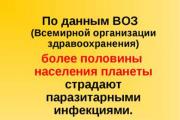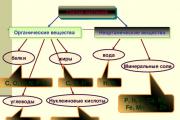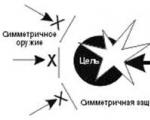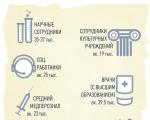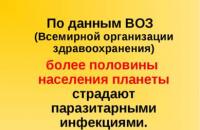22.06.2022
Why is it so important to read books aloud to children from birth? Why is it important to read aloud to children? Gives knowledge about the world around us
Reading has several important functions in the life of a cultured person. The most obvious of them is cognitive. Thanks to the book, a whole world opens up before the child, about which he still knows almost nothing. The book expands the natural boundaries of knowledge, allowing the child to learn about things that he may never even have to see.
Another, even more significant function of literature is educational. With the help of the simplest, gradually becoming more complex images, the child learns the laws of life in society, the rules of communication with his own kind. Often a good book allows parents to explain to their child things that they themselves would not be able to accurately formulate. Sometimes it is book examples that gradually help a child learn those rules that he could not or wanted to perceive from his parents’ lips.
At first glance, television and the Internet could take on a cognitive and educational role. However, even if we do not mention that television and the network space are filled with information that is not only useful for children, no high technology can replace reading for a child. And here's why. Even if we imagine an ideal television for children, the entire broadcast of which consists entirely of high-quality children's films and popular science programs, it still loses out in relation to a good library. Firstly, because frequent changes of pictures, a variety of emotions and constant sound tire the brain, making it difficult to assimilate information. Secondly, unlike a video series, a book provides space for human imagination, for comprehension and awareness of what is read.
Information obtained from books is close to human empirical experience, because the reader has to independently delve into the text, isolate what is necessary, separating the main from the secondary. Information from the screen comes in ready-made form, does not use the resources of our consciousness and does not develop either imagination, intuition, or the cognitive abilities of the human brain. In other words, such information “flies in one ear and out the other.”
In addition to spiritual enlightenment, there is also an absolutely pragmatic need for reading books. It has long been no secret for teachers that “well-read” children are much less likely to have problems with literacy, both in oral and written speech. Firstly, while reading, a child imperceptibly learns the laws of a beautiful, literary language, learns not only to speak and write, but to think intelligently. Errors in word usage and management hurt the ears of a well-read person. Secondly, everyone knows that every book read increases the vocabulary of even an adult, not to mention children and teenagers.
The problem of schoolchildren's literacy is particularly acute today. An increasing number of children are being sadly diagnosed with dysgraphia, and most young people make banal errors in spelling and punctuation. Meanwhile, it has been proven that the so-called “innate literacy” is also the result of a person being well-read. The fact is that during the reading process, visual memory captures visual images of words. When writing, these images “pop up in the head” automatically, and the person, without thinking, writes correctly and immediately notices spelling errors on paper. Such a person does not need to cram complex rules and exceptions; he just needs to read more often.
Asking the question “How to get a child to read?” the parent is already making a mistake. It is impossible to force reading with interest, just as it is impossible to force a child to play a boring game. Many teachers initially instill in children that reading is “hard, but necessary,” instead of captivating the child with an interesting book. Children who read “under pressure” in elementary school will happily forget about books as soon as parental and school control ends. And the information that a person comprehends “through force” leaves no trace in his soul. Therefore, it is necessary to teach a child a love of reading, and this is almost entirely in the hands of moms and dads.
Shared reading plays a huge role here. It is necessary to read fairy tales to your child from a very early age. But don’t think that reading aloud is necessary only until the child learns to read on his own. Reading together in a family is a fascinating activity that brings all its members unusually closer together. Reading to a child is not just the responsibility of parents, it is a unique way of communication that has practically no substitute.
Significant aspects of child development that are addressed in the process of shared reading:
Satisfying the need for security.
Sitting on Mom or Dad's lap (or snuggling next to a parent) while reading a book creates a feeling of closeness, security, and safety. A single space and a sense of belonging are created. Such moments have a strong influence on the formation of a comfortable feeling of the world.
A sense of value and significance of one’s “I” and one’s interests.
When parents read what is interesting to the child and are ready to discuss with him topics that are significant to him, they strive to understand his views as best as possible, the child develops an idea of himself as a significant person, whose needs and interests are important (since they are given attention to such important people are parents).
Formation of values.
The book influences the child’s moral ideals, shaping his values. The heroes of the books perform various actions, experience different life situations, consonant with the world of the child or unknown to him. Using examples of situations in which the heroes of books find themselves, the child learns to understand what good and evil, friendship and betrayal, sympathy, duty, honor are. And the task of parents is to help see the reflection of these values in the child’s life.
Responding to significant experiences.
A book is also a means of responding to (discharging) experiences that are painful or frightening for a child, which it is not always possible to cope with in a familiar situation. The child, together with the hero, experiences his failures and victories, overcomes fears and difficulties on the way to his goal. Thus, freeing yourself from your own fears and negative experiences. That is why a child can re-read a story (or a whole book) many times if it is consonant with his life situation. The child experiences again and again what he cannot yet cope with in reality.
Teaching new or necessary behaviors
.
Through the book, the child perceives various models of behavior (how to be friends, how to achieve goals, how to resolve conflicts), which can be effective in various life situations. The greatest effect can be achieved if the reading is also supplemented by a joint discussion of who learned what, what they liked, what was close, what scared them, what amused them. Parents can help their child see analogies between what they read and their own life.
The love of reading, instilled in childhood, accompanies a person throughout his life. And the time spent reading will certainly pay off, because the book teaches a person to think, to adequately assess the situation and his role in life, the book teaches a person to think and make decisions, and contributes to the formation of his own, unique philosophical view of the world.
1. Thanks to reading, the child’s SPEECH develops and his vocabulary increases. The book teaches a little person to express his thoughts and understand what other people say.
2. Reading develops THINKING. From books, a child learns abstract concepts and expands the horizons of his world. The book explains life to him and helps him see the connection between one phenomenon and another.
3. Working with a book stimulates CREATIVE IMAGINATION, allows imagination to work and teaches children to think in images.
4. Reading develops cognitive interests and broadens your horizons. From books and periodicals, a child learns about other countries and a different way of life, about nature, technology, history and everything that interests him.
5. Books help a child KNOW HIMSELF. It is very important for self-esteem to know that other people think, feel and react the same way as he does.
6. Books help children UNDERSTAND OTHERS. By reading books written by writers from other cultures and eras, and seeing that their thoughts and feelings are similar to ours, children understand them better and get rid of prejudices.
8. Books are PARENTS' ASSISTANTS in solving educational problems. They teach children ethics, force them to think about good and evil, develop the ability to empathize, and help them learn to empathize with other people.
9. Books give strength and inspiration. They captivate and entertain. They make children and adults laugh and cry. They reduce loneliness, bring comfort and indicate a way out of difficult situations.
10. Reading is the most ACCESSIBLE and USEFUL activity for a child’s intellectual, emotional and mental development. You can take the book with you anywhere. It's free to borrow from the library and doesn't require power.
1. Before auditioning work of art It is necessary to remove from sight all interesting toys, entertaining household things - everything that can prevent the child from listening to a story or fairy tale.
2. The literary text must be selected in accordance with the age and individual characteristics of the child.
3. Acquaintance with a literary work occurs by ear, so an adult should pay special attention to the ability to read the text expressively, make logical accents in the right places, and observe the necessary pauses.
4. Show your child colorful illustrations that will help him understand the text better. IN preschool age everything is taken almost literally, which means that when choosing a book, pay attention to the fact that the proposed illustrations are as realistic as possible.
5. While reading a literary work, it is advisable not to be distracted by extraneous matters. Remember that six-year-old children are able to actively and productively engage in one activity for about 15 minutes. Find this time for your child.
6. Be sure to ask your child questions about what you read.
7. Instill in your child from childhood a love of books and a caring attitude towards them.
True, no PISA studies were conducted in the Soviet Union at all. So we cannot compare the results of that time with today. We have never conducted serious research related to children's reading, so we cannot objectively judge its dynamics. And all our catastrophic moods usually have one argument behind them: we read with a flashlight under the blanket, but our children don’t read.
And our methods of “saving culture” are approximately the same. We punish the child for “not reading” (depriving him of the opportunity to play on the computer) and reward him for obedience: did you finish reading the book? Good girl! I’ll give you an extra hour for the same games. We are inventing crafty tricks with forbidden fruits: it’s too early for you to read this book, so I’ll put it here, higher up - see where? We bore the child with our grumbling that he is not worthy to be our son (daughter), unlike Vanya from the fifth entrance, who reads so much - just like we did in childhood! We are even ready to buy our child some kind of clever flashlight so that he can finally crawl under the covers with it.
And sometimes it seems to us that we are achieving some result...
At least that's what I thought for a long time.
During almost twenty years of my work at school, I came up with everything - democratic, tyrannical, bureaucratic - forcing my students to read.
And all the time it seemed to me that I had finally found - here it is, the golden key that will open the treasured door to the country of reading children.
But recently, at a book fair in Krasnoyarsk, I met my favorite student - one of those whom I considered a reading child. He came to the fair with the “Interactive Book” project and in a confidential conversation explained to me that there is a key to reading: you just need to give up the book in the classical sense of the word. The book should be something between a computer game and a guide to social network. And if I do not want to admit this, then I am an “outdated model of a person” who denies the inevitability of technical progress. Why am I even fussing over this reading? There are also decent people among those who don’t read. And they are no more stupid than the readers. On the contrary, they are smarter, because among them there are a lot of computer scientists and programmers. And their life is very normal - not like mine. (This is, admittedly, a strong argument.)
In other words, questions arise.
And before looking for the key, we must, apparently, first answer the question: why do we need THEM to read?
In relation to children of different ages the answer will vary.
Kids don't read on their own. Reading to kids. And this is one of the fundamental conditions for development: reading shapes children's speech. And speech is the basis of thinking.
In particular - logical thinking. Any teacher will always, at first glance, distinguish a child who is being read to from a child who is not being read to, by how he knows how to concentrate, hold attention, listen and hear, and understand. When a child listens to a book, he hears not just speech, but book speech. Book speech differs significantly from oral speech. It is much more complex, since it is not related to a specific communication situation, i.e. is not complemented by the visual perception of the interlocutor, facial expressions and gestures. It operates with a much larger number of words than spoken language, and it is always distinguished by more complex grammatical structures. And grammar (ways of constructing statements, ways of connecting words, that is, the formal structures of language) reflects the ways of human thinking.
In relation to the child primary school It’s also quite easy for us to explain why we should teach him to read and encourage him to read books. Reading has been and remains a basic learning skill. It is, first of all, a tool for extracting information.
It would seem that what else could be added? Train your child in technique - and you will get what you want.
But our fourth grader reads at a speed of 150 words per minute. And he doesn’t seem to have any problems understanding educational texts. But he hasn’t read fiction books and still doesn’t read them. And for some reason this greatly upsets us - despite his reading technique indicators.
I once discussed this problem with my third graders. (I discussed a lot of things with them.) I asked what they thought: why should a person read?
We quickly came to the conclusion that the old formula: “Read to know a lot” (which worked in the old days, when today's teachers sat with flashlights under blankets) was no longer needed. Today, you can get the information you need from other sources. In particular, from popular science films. “To get smarter” is a more compelling reason. We decided that reading is more difficult than watching, which means that reading makes us more tense - it trains our attention and perception. After all, while reading, we are engaged in “deciphering” signs, and at the same time we must imagine what images and concepts are behind the words and expressions.
But then we could limit ourselves to reading encyclopedias and scientific books. Why artistic? If only for entertainment, it seems strange. Why entertain yourself in such a complicated way when you can watch a movie?
I remember they thought a lot, my third graders. And someone said: while reading, I always imagine myself as one of the heroes. When I read, I can be both a princess and a crocodile. But in life I can’t do that.
I exclaimed: here it is! This is exactly what the great scientists thought. The great psychologist Lev Vygotsky, who lived in the last century, wrote that art allows a person to live different lives in his imagination and gives him experiences that he could never have in reality. Thanks to books, we can truly be both a princess and a crocodile. And as a result, we understand how complex the world is and how complex humans are.
It is for this reason - for the sake of understanding human complexity - that we should read books. The more people understand this, the fewer terrible acts are committed around us.
What does reading aloud do to a child?
I want to say that I see no other serious reasons to fight for children's reading. But this reason seems quite compelling to me.
However, this does not mean that after the answer to the question “why read books?” The answer to the question “how to encourage reading?” will come naturally.
Worse, I think there is no universal answer to this question. There is no single, infallible method that would allow us to raise a reading child. A child (like an adult) becomes a reader as a result of many different internal reasons and external circumstances.
But we know exactly what can be done to ensure that the book enters a child’s life.
This is not God knows what discovery. We have all done and are doing this. But this had to be justified rationally. And the “damned” Americans did this in the 80s of the twentieth century. They experienced the advent of VCRs “in every family” and children’s own televisions earlier than we did, and recorded a decline in interest in reading. This was before the advent of personal computers. But their concerns were based not on subjective observations of the disappearance of flashlights in children's bedrooms, but on large-scale research. In the 80s, 1,200 research projects were launched annually in the United States, the topic of which was children's reading.
In 1983, the Americans created the Reading Commission, which spent two years studying the results of the research and by 1985 prepared a voluminous report called “Becoming a Nation of Readers.”
This report stated the most important message: “The single most important factor necessary for successful reading is reading aloud to children.” This report was followed by "experiments". For example, in one of the Boston schools, an invited enthusiast began to come to the sixth grade every Friday and read aloud to the children. A year later, the academic performance of this class improved noticeably, and two years later it skyrocketed. Another year later, the students in the class had the highest reading scores in Boston, and a huge line of people wanted to get into this school.
In the state of Connecticut, six freelance reading teachers were invited to work, who read to students in grades four through six for 20 minutes three times a week in different grade levels. As a result, students developed a need for independent reading. (The French educator and writer Daniel Pennac described something similar in his book “Like a Novel.”)
The power of the book and reading aloud as a mission
Of course, reading aloud to children cannot be considered a panacea for all ills. But this is what we can do. And for children of any age, what was said about reading to young children is true: even if the child himself does not read, what is read to him will become part of his cultural baggage.
It is clear that it is too late to start reading aloud to teenagers (although it is not useful, as the experience of Pennac and Steven Lewenberg from a Boston school shows). It is better to start reading to your child when he is still very young. And start with the understanding that this is the most important type of communication with a child.
The child does not yet know how to read on his own. An adult who has this skill acts as a medium, an intermediary between the book and the child, replacing the invisible interlocutor (the author). A parent at the moment of reading can be likened to Moses, who descended from Mount Sinai with the Book, illuminated by the highest light. Here our cultural role is unconditional, our impact is visible, our means have proven power.
Take, for example, the form of a book that is familiar to us. This is a brilliant invention of mankind, akin to a wheel. A book in the form of a codex - quadrangular parchment pages inserted between wooden tablets - appeared in the 2nd century BC and gradually replaced clay tablets and scrolls. Since then, the material for making pages and the method of decorating books have changed, printing has been invented, but the shape of the book has remained unchanged.
The code book has the ability to structure communication in space and time. For example, she dictates to you which side to sit your child on. You will sit your baby to your right - so that it is convenient for him to follow the opening pages with pictures. (If you are reading not to one, but to several children, then on the right you will probably seat the one who needs the most comfortable conditions and physical contact with you - most likely the younger one.)
When you open a book, you know approximately how much time you will spend reading: chapters, parts, small fairy tale or poems.
You are guaranteed high-quality communication content. Not to mention that at the moment of reading, you and your child find yourself in a field of common experiences.
When you read, your voice is more than just a voice. As mentioned, you let the author speak in your voice. But, in addition, you also “turn” the author’s voice towards the child. Thanks to you, the author addresses himself not to the collective image of a “grateful descendant,” not to readers “in general,” but to a specific person, your child.
And personal appeal - most important factor development.
Psychologists made an interesting observation: in early childhood groups attended by children under three years old, it is impossible to say: “Children! Come to me quickly!” The children won't react. You must definitely call everyone by name: “Vanya, come to me quickly! Mashenka, come here!”
The situation of direct personal interaction between a child and an adult is primary in relation to the actual verbal communication, predetermines the very possibility of speech development. Therefore, for example, “technical” speech (recorded on a tape recorder, heard from a TV, etc.) does not in any way affect speech development early child. If you install a tape recorder in the Baby House and it sings lullabies for 10 hours in a row or says something, this will not affect the mental development of unfortunate babies in any way.
Of course, an older child will enjoy listening to both children's programs on the radio and audio books. But listening to technically reproduced speech is possible and advisable only in an already “developed” speech space. And it, of course, cannot completely replace living, personally addressed reading.
Personality in the transmission of information retains its significance throughout a person’s life. This is why, for example, individual lessons with a teacher in any subject (and especially language lessons) are more effective than group ones. This is why it is so important that teenagers have human contact with a teacher, etc.
Therefore, apparently, reading aloud to children at any age turns out to be an effective development mechanism.
Therefore, READ OUT LOUD TO CHILDREN.
This does not mean that reading aloud is simple and easy. Especially in the situation of communicating with teenagers (here you can also remember Moses).
But I think it’s important to get used to the idea first.
Marina Aromstam
Information about research projects on children's reading in the USA and about the report “Becoming a Nation of Readers” is taken from the article by the famous American educator Jim Trilese “A New Guide to Reading Aloud” (translation from English by N. Goncharuk), a collection of materials “Reading from the screen and “by ear” : experience of Russia and other countries" - M.: "Russian Library Association", 2009)
All parents dream that their children grow up smart, educated and read a lot of books. However, not all parents themselves love to read, and then wonder why their child refuses books.
You need to instill a love for books from early childhood, then there will be no problems later. The child should develop the habit of reading and then at an older age, he will also continue to read. You can start reading books to your child from the cradle. It is known that reading in early childhood helps a child develop and think. In addition, reading increases vocabulary, develops imagination and horizons, and improves literacy. The child becomes assiduous.
Children unconsciously compare themselves with the main characters of books and try to experience certain events with them. Therefore, books should be chosen carefully for your child. huge selection You will find children's literature in the fairy-tale Hobobo library http://www.hobobo.ru/stihi/. When choosing a book, consider the age and interests of the child; the book should interest him.
It is better to introduce your child to books from birth. A book is a very important form of communication between a child and parents. While you are taking care of your baby (bathing, feeding, etc.), tell him little nursery rhymes and fairy tales. Of course, the baby doesn’t understand anything yet, but he perfectly grasps intonation and sounds.
When the child learns to sit, you can begin to introduce him to books. Sit down together, take a book and read with expression, look at the pictures. Such communication creates a close connection between you, all attention is directed to the baby, which is very important for him. He feels calm, which is very important for mental development.

Give your child the opportunity to independently choose a book from the shelf. Answer all his questions and explain what is happening in the book. After reading, discuss with your child what you read: the actions of the characters, situations, etc. Explain to your child what is good and what is bad. Introduce your child to words such as friendship, duty, love, etc. All this will help the child develop as a person.
Don't be lazy to give your child some time. Of course, it’s easier to make your child watch cartoons, but will this replace your attention?
And a few more tips:
- Be sure to read for yourself, your example is best for your child.
- When choosing or buying books, be sure to involve your child in this process.
- Give your child a book.
- Retell to your child books you read as a child.
- Read every day, at least for 15 minutes before bed.
Ekaterina Abdelnasir
Consultation “Why read books to children?”
Parents want their children to have a lot read. But not all parents themselves read or can read together with children. Unfortunately, now in many ways the reading books replaced by cartoons. For a child to grow up mentally healthy, he needs full communication with his parents. And reading together provides such an opportunity. When a child sits on a parent's lap or next to them while reading books, he creates a feeling of closeness, security and safety. Such moments have a strong influence on the formation of a comfortable feeling of the world.
Book influences moral education child, shaping his values. After all, heroes books perform different actions, experience different life situations. Using examples of situations in which the heroes find themselves books, the child learns to understand what good and evil, friendship and betrayal, sympathy, duty and honor are. And also the child, together with the hero, experiences his failures and victories, overcomes fears and difficulties on the way to his goal. Thus, freeing yourself from your own fears and negative experiences.
And the task of parents is to help see these values in the child’s life. As a rule, in families where parents often and a lot read to children, there is a harmonious, friendly atmosphere. Reading books Parents to their child can be considered as an indicator of a prosperous family.
Publications on the topic:
Consultation “How to read books to preschool children” 1. Before listening to a work of art, it is necessary to remove all interesting toys and entertaining household toys from the child’s field of vision.
Consultation for parents “Why children need to play”“Without play there is not and cannot be full-fledged mental development. Game is a huge bright window through which a child flows into the spiritual world.
Rules for reading books to a child 1. Show your child that reading out loud gives you pleasure. 2. Show children respect for the book.
Consultation “What fairy tales should children read at night?” In psychology there is separate direction– fairytale therapy. Its main idea is that the child identifies himself with the main character.
Consultation for parents “What and how to read to children”“What and how to read to children” Topic: “What and how to read to children” Age: 5-6 years Purpose: To promote interest and love for reading, books;
Consultation for parents “What children should read” Recommended reading for children middle group Russian folklore Songs, nursery rhymes, chants. “Our goat.”; “Little cowardly bunny.”:.
Consultation for parents “What books to read for children 1–3 years old” Prepared by MBDOU teacher kindergarten No. 18 r. p. Mukhen Ivanchenko I.V. What is a book for a child of this age? Of course, one more.
Consultation for parents “Books for children” Books for children. At the age of two, a child learns words, concepts and ideas faster than at any other time in his future life.



